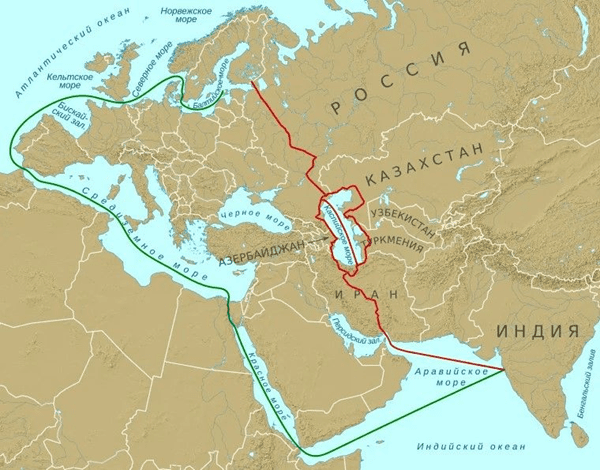Author: Fabrizio Vielmini – 30/09/2022
The II Caspian Economic Forum
After two years of delay, next October, Russia will organize the economic follow-up of multilateral cooperation of the five countries sharing the Caspian Sea. The event assumes specific importance on the background of the conflict in Ukraine
Fabrizio Vielmini – Specialist in Russia and Central Asia, research associate at Vision & Global Trends
The global confrontation provoked by the crisis in Ukraine shows no sign of diminishing and takes on new dimensions. Away from the battlegrounds, it develops in the diplomatic and economic fields. While Europe and Western countries are building up sanctions pressure on Russia, the latter continues its multilateral efforts to strengthen its positions and overcome international isolation in Asia and the Middle East. To a certain extent, Russian efforts are getting positive responses from the side of China and India. The connections established by Moscow with the two powers are not such to completely offset the efforts of the “collective West” but are nonetheless devaluing Western pretentions that Russia is isolated.
As part of its response, Russia organised at the beginning of September the Eastern Economic Forum (EEF). The EEF-2022 delivered an aggregate of contracts and investments with resulting projects worth the amount of some 58 million euros. Next came the SCO Summit in Samarkand which indicated that between Russia, India, China and Iran there is an overall rapprochement, if not on political terms at least based on a shared vision of international relations. A very important outcome of the Summit was the official application of Iran for membership in this organization.

Figure 1 The North South Corridor (red) as an alternative of the maritime route through Suez (green)
On 5th October, Moscow will host the II Caspian Economic Forum (CEF), an economic platform part of the cooperation between the five littoral countries of Eurasia’s biggest inland water reservoir, Russia, Iran, Azerbaijan, Kazakhstan and Turkmenistan. Postponed in 2020 and 2021 because of sanitary measures, the CEF assume specific importance on the background of the ongoing conflict since is expected to be a further step in the consolidation of the “Caspian Five” (C5) cooperation. The Forum will follow up on the results of the VI C5 Summit, which took place in June in Turkmenistan.
Acting as a host, Russia will undoubtedly make efforts to further bring together its positions with the economic and political outlook of the neighbours. This consolidation is of paramount importance against the backdrop of ongoing military operations on the territory of Ukraine. Of paramount importance is the increasing entente with Iran, a heavyweight country in this forum, which is supporting the Russian positions in the international arena. The other Russia’s Caspian partners are far from being opponents of Moscow in this difficult moment.
After the imposition of anti-Russian sanctions, the importance of the Caspian Sea has been rising significantly for Moscow. As a ring of friendly states, the region stands as an important element for Russian efforts to rebut Western pretentions to isolate the country. For Moscow, it is important to remain on the top of the evolution of regional dynamics in terms of trade and connectivity. The war in Ukraine caused the closure of the transit route to Europe through Russia (as exemplified by the situation around the Russian exclave of Kaliningrad). This brought a blow to Chinese interests, since Beijing invested billions to develop the infrastructures of the Belt Road Initiative (BRI) in order to reach European markets. China is accordingly participating in the efforts of the Caspian states to divert the flows and investments coming from China to the Trans-Caspian route, between Kazakhstan and Turkmenistan and Azerbaijan. The latter is in a close relationship of alliance with Turkey, a fact that creates considerable apprehension among Russians and Iranians. Kazakhstan as well has intensified the pace of its cooperation with Turkey ans Azerbaijian.
As a counterbalance to these trends, Russia and Iran powers are pushing to develop a North-South corridor enabling the transportation of goods between Western Eurasia and the Persian Gulf via the Caspian and Central Asia. Following the trilateral Russian-Iranian-Azerbaijani meeting, on 9th September 2022, the Deputy Prime Ministers of Azerbaijan and Russia, Shahin Mustafayev and Alexander Novak, together with the Minister of Roads and Urban Development of Iran, Rustam Kasemi, signed the Baku Declaration dedicated to the development of the North-South multimodal International Transport Corridor (ITC). Events like the Caspian forum are important since they offer an opportunity to reduce the existing contradictions between the so that to harmonize the West-East and North-South corridors perspectives for common benefit.
For the EU, this event is of great interest in the light of the fact that out of the five Caspian states, three (Kazakhstan, Turkmenistan and Azerbaijan) somehow fall into the sphere of interests of European countries within the framework of the so-called. “Eastern Partnership” and the EU Strategy in Central Asia, approved in 2019.
The Caspian Sea is also important as a source of energy for European economies, where European oil and gas companies (such as, for example, the Italian ENI) are actively involved in production and transportation. In addition, the Caspian is relevant to the Eastern Partnership EU project as well as to strategic military-political trends, taking into account that Russia has fired missiles at Ukraine from its ships in the basin and that NATO (primarily the United States) use the Caspian connection for the logistics of its military cooperation with the countries of the region as earlier with Afghanistan.
All in all, despite the war in Ukraine and attempts to make Russia an outcast, it is clear that no stable geopolitical configuration or economic development in the Caspian will advance without taking into account the interests of Moscow and its allies.

Fabrizio Vielmini – Specialist in Russia and Central Asia, research associate at Vision & Global Trends. International Institute for Global Analyses
